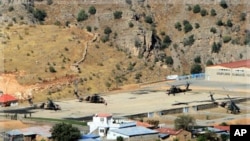Turkey has widened its military incursion into neighboring northern Iraq. The operation, which started on Wednesday, came in response to the killing of 24 Turkish soldiers in attacks by the rebel Kurdistan Workers' Party, or PKK, some of whom are based across the border in Iraq. Outrage over the killings among the Turkish public continues to grow.
Hundreds of people chanted "Death to the PKK," as they marched down Istanbul's main street. One demonstrator expressed his anger over the killings. He said the PKK are evil and that people are out to support their 24 martyrs. He said the PKK will never divide Turkey and that you can never kill enough of them.
Similar protests against the PKK are occurring across the country. Wednesday's attacks by the rebel group were the deadliest since 1993 and have shocked the country.
Radio stations played somber music and television stations cancelled comedies as an unofficial day of mourning was observed by many in Turkey. Houses and shops raised the Turkish flag as anger has led to a wave of nationalism that is being fueled by continuous news coverage of Turkey's ongoing military incursion into neighboring northern Iraq.
Initially aimed at tracking down the Kurdish rebels who carried out Wednesday's attacks, Turkish Prime Minister Recep Tayyip Erdogan indicated it is now a far more extensive operation.
He said Turkey's military forces are carrying out the land and air operation in a decisive manner. In televised remarks Thursday, the prime minister said the operation is part of the solution to terrorism, that it is the first step toward reaching the end result.
Turkey's armed forces say 22 battalions are involved in the incursion. Experts say that could mean between 10,000 and 15,000 soldiers may now be in Iraqi territory, making it Turkey’s largest incursion into Iraq since 2008.
A senior Iraqi Kurdish official, Nechirvan Barzani, flew to Ankara for talks and pledged to cooperate with Turkey. But Ankara is looking for more than words from the Iraqi authorities.
Turkish Foreign Minister Ahmet Davutoglu, in response to a similar pledge from his Iraqi counterpart, Hoshyar Zebari, said Turkey wants concrete steps, not words. But as the Turkish military incursion continues to grow, retired brigadier general Haldun Solmazturk, a veteran of previous operations into Iraq, warns of their limited effect.
"A small-scale operation focusing mainly on PKK elements would achieve above all a psychological effect that would carry the message to [the] PKK that northern Iraq is not a safe haven. But honestly, the [existence] of the PKK element in a couple of camps in northern Iraq [is] just (a) small extension of the major problem inside Turkey," Solmazturk said.
The Turkish government, keen to ease public outrage over the PKK attacks, appears for now firmly committed to pursuing a military solution to the nearly three-decade-long conflict. But political scientist Cengiz Aktar of Istanbul's Bahcesehir University says that along with anger, there is also fatigue among the people regarding the seemingly endless conflict,
"There is a general fed-up in the Turkish public opinion. Everyone, including those voices who are not necessarily pro-Kurdish, [is] calling for peaceful solutions. The whole question [of] who is capable of going back to the negotiation table. And we will see quite shortly whether that will happen or not," Aktar said.
For now, observers say that seems unlikely with the Turkish prime minister not only attacking the PKK but also the country's main legal Kurdish party, the BDP. Mr. Erdogan is accusing the party of being a voice of terrorism and is calling on its leaders to condemn the PKK as terrorists. The BDP has refused to do so, instead calling for an immediate end to fighting by both sides.
Turkey Crosses into Northern Iraq in Offensive Against Kurdish Rebels




